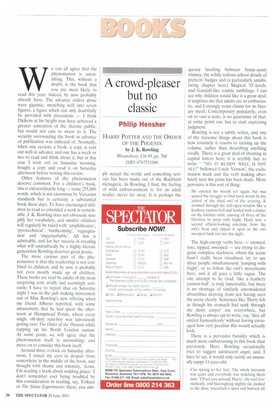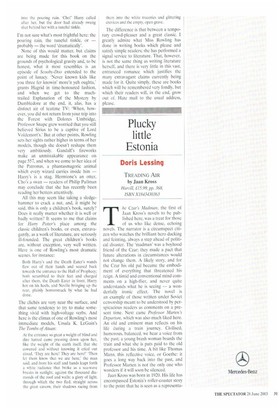A crowd-pleaser but no classic
Philip Hensher
HARRY POTTER AND THE ORDER OF THE PHOENIX by J. K. Rowling Bloomsbury, £16.99, pp. 768 ISBN 074755 1006 We can all agree that the phenomenon is astonishing. This, without a doubt, is the book that you are most likely to read this year; indeed, by now probably already have. The advance orders alone were gigantic, stretching well into seven figures, a figure which can only doubtfully be provided with precedents — I think Dickens at his height may have achieved a greater saturation of the literate public, but would not care to swear to it. The security surrounding the hook in advance of publication was unheard of. Normally, when one reviews a book, a copy is sent out well in advance and one has a week or two to read and think about it, but in this case I went out on Saturday morning, bought a copy and read it on Saturday afternoon before writing this review.
Other features of the phenomenon deserve comment. For a children's book, this is extraordinarily long — some 255,000 words, which is not enormous by Victorian standards but is certainly a substantial book these days. To have encouraged children to read so extended a work is remarkable. J. K. Rowling does not obviously simplify her vocabulary, and smaller children will regularly be taxed with 'amphitheatre'. 'pyrotechnical', 'forthcoming', 'regurgitation' and 'imperturbable'. All this is admirable, and for her success in creating what will undoubtedly be a highly literate generation Rowling deserves great praise.
The more curious part of the phenomenon is that the readership is not confined to children, and by now is probably not even mostly made up of children. These books are read by adults of the most surprising sort, avidly and seemingly seriously; I have to report that on Saturday night I was in the pub making mincemeat out of Miss Rowling's new offering when my friend Alberto reported, with some amusement, that he had spent the afternoon at Hampstead Ponds, where every single off-duty rent-boy was laboriously poring over The Order of the Phoenix while topping up his North London suntan. At some point, we will agree that the phenomenon itself is astonishing: and move on to consider this book itself.
Around three o'clock on Saturday afternoon, I raised my eyes in despair from somewhere in the middle of the book, and thought with shame and intensity, 'Jesus, I'm reading a book about sodding pixies.' I don't remember ever being troubled by this consideration in reading. say, Tolkien or The Sirian Experiments: there, you sim ply accept the world, and something serious has been made out of the Rackham menagerie. In Rowling, I find, the feeling of mild embarrassment is, for an adult reader, never far away. It is perhaps the queasy lurching between funny-aunty whimsy!, the wildly tedious school details of prefects' badges and (a particularly annihilating chapter here) Magical '0'-levels. Lind Gandalf-like cosmic ramblings. I can see why children would like it a great deal; it surprises me that adults are so enthusiastic, and I strongly resist claims for its literary merit. Contemporary popularity, even on so vast a scale, is no guarantee of that: at some point one has to start exercising judgment.
Rowling is not a subtle writer, and one of the tiresome things about this book is how routinely it resorts to turning up the volume, rather than describing anything vividly. There is a great deal of shouting in capital letters here; it is terribly lazy to write "NO, IT RUDDY WELL IS NOT ALL!" bellowed Uncle Vernon', the exclamation mark and the verb making absolutely sure the point has been made. More pervasive is this sort of thing: He opened his mouth yet again, but was spared the struggle to find more words by the arrival of the third owl of the evening. It zoomed through the still-open window like a feathery cannon-ball and landed with a clatter on the kitchen table, causing all three of the Dursleys to jump with fright. Harry tore a second official-looking envelope from the owl's beak and ripped it open as the owl swooped back out into the night.
The high-energy verbs here — zoomed, tore, ripped, swooped — are trying to disguise complete slackness, where the scene hasn't really been visualised; try to see three people simultaneously 'jumping with fright', or to follow the owl's movements here, and it all goes a little vague. The one attempt to be vivid, 'like a feathery cannon-ball', is truly lamentable, but there is no shortage of similarly unconsidered absurdities deriving from not having seen the scene clearly. Sentences like 'Harry felt as though his stomach had sunk through the dusty carpet' are everywhere, but Rowling is always apt to write, say, 'they all smiled humourlessly' without having envisaged how very peculiar this would actually look.
There is a pervasive banality which is much more embarrassing in this book than previously. Here, Rowling occasionally tries to suggest adolescent angst, and, I have to say, it would only satisfy an unusually sappy 11-year-old: Cho sprang to her feet. The whole tearoom was quiet and everybody was watching them
now, sec you around, Harry,' she said dramatically, and hiccoughing slightly she dashed to the door. wrenched it open and hurried off
into the pouring rain. 'Cho!' Harry called after her, but the door had already swung shut behind her with a tuneful tinkle.
I'm not sure what's most frightful here: the pouring rain, the tuneful tinkle, or — probably — the word 'dramatically'.
None of this would matter, but claims are being made for this book on the grounds of psychological gravity and, to be honest, what it most resembles is an episode of Scooby-Doo extended to the
point of lunacy. 'Never known kids like you three fer know-in' more'n yeh oughta,' grunts Hagrid in time-honoured fashion, and when we get to the muchtrailed Explanation of the Mystery by Dumbledore at the end, it, alas, has a distinct air of teatime TV: 'When, however, you did not return from your trip into the Forest with Dolores Umbridge, Professor Snape grew worried that you still believed Sirius to be a captive of Lord Voldemort's.' But at other points, Rowling sets her sights rather higher in terms of her models, though she doesn't reshape them very ambitiously. Gandalfs fireworks make an unmistakable appearance on page 557, and when we come to her idea of the Patronus, a phantasmagoric animal which every wizard carries inside him — Harry's is a stag, Hermione's an otter, Cho's a swan — readers of Philip Pullman may conclude that she has recently been reading her betters attentively.
All this may seem like taking a sledgehammer to crack a nut, and, it might be said, this is only a children's book, surely? Does it really matter whether it is well or badly written? It seems to me that claims for Harry Potter's place among the classic children's books, or even, extravagantly, as a work of literature, are seriously ill-founded. The great children's books are, without exception, very well written. Here is one of Rowling's most dramatic scenes, for instance:
Both Harry's and the Death Eater's wands flew out of their hands and soared back towards the entrance to the Hall of Prophecy; both scrambled to their feet and charged after them, the Death Eater in front. Harry hot on his heels, and Neville bringing up the rear, plainly horrorstruck by what he had done.
• The clichés are very near the surface, and that same tendency to try to make something vivid with high-voltage verbs. And here is the climax of one of Rowling's most immediate models, Ursula K. LeGuin's The Tombs of Atuan:
At the entrance so great a weight of blind and dire hatred came pressing down upon her, like the weight of the earth itself, that she cowered and without knowing it cried out aloud, 'They are here! They are here!' 'Then let them know that we are here,' the man said, and from his staff and hands leapt forth a white radiance that broke as a sea-wave breaks in sunlight, against the thousand diamonds of the roof and walls: a glory of light, through which the two fled, straight across the great cavern, their shadows racing from
them into the white traceries and glittering crevices and the empty, open grave.
The difference is that between a temporary crowd-pleaser and a great classic. I greatly admire what Miss Rowling has done in writing books which please and satisfy simple readers; she has performed a signal service to literature. That, however, is not the same thing as writing literature herself, and there is very little in this vast, entranced romance which justifies the many extravagant claims currently being made for it. Quite simply, these are books which will be remembered very fondly, but which their readers will, in the end, grow out of. Hate mail to the usual address, please.



































































 Previous page
Previous page